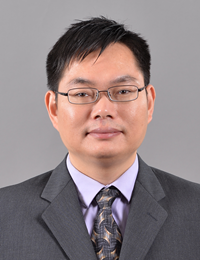HUANG Chuanxin

HUANG Chuanxin
E-mail: huangcx@shsmu.edu.cn
Tel: 63846590-776724
Laboratory of B cell Response and Tumor
Research Field:
1.Transcriptional and epigenetics control of lymphocyte development and transformation
2.Immunotherapies for B-cell lymphoma
3.Autoantibodies-related diseases
Personal Introduction
Dr. Huang Chuanxin graduated from the Institute of Neuroscience of the Chinese Academy of Sciences in 2007, completed his postdoctoral training at Cornell University School of Medicine, and joined the Shanghai Jiao Tong University School of Basic Medicine/Shanghai Institute of Immunology in 2015 as a research group leader. His research interests include the transcriptional and epigenetic mechanisms of B lymphocyte development and malignancy, which provides a new theoretical basis and therapeutic target for elucidating the pathogenesis of autoimmune diseases and B-cell lymphoma. In recent years, he has published several correspondence and co-corresponding author papers in international academic journals such as Nat Commun, Cell Res, Cell Reports, Autophagy and J Immunol. He has presided over a number of National Natural Science Foundation of China and Shanghai Municipal Natural Science Foundation, and participated in a number of key research and development projects of the Ministry of Science and Technology.
Scientific Research Projects
National Natural Science Foundation of China (Bcl6 mediates germinal center response through regulating PD-L1/2 expression and its underlying molecular mechanism) (2019-2022)
National Natural Science Foundation of China (Transcription factor Bach2 controls germinal center B-cell differentiation and the underlying molecular mechanism) (2021-2024)
Ministry of Science and Technology of the People’s Republic of China (Strategy for generation of CAR-T cells against T-cell lymphoma) (2019-2023)
Shanghai Science and Technology Committee (Bach2 constrains chronic lung inflammation and underlying molecular mechanism)(2020-2022)
Publications
Chen X, Xu Y, Chen Q, Zhang H, Zeng Y, Geng Y, Shen L, Li F, Chen L, Chen GQ, Huang C*, Liu J. The phosphatase PTEN links platelets with immune regulatory functions of mouse T follicular helper cells. Nat Commun. 2022 May 19;13(1):2762.
Zhang H, Dai D, Hu Q, Yang F, Xue Y, Li F, Shen N, Zhang M, Huang C*. Bach2 attenuates IL-2R signaling to control Treg homeostasis and Tfr development. Cell Rep 2021 May 11;35(6):109096.
Peng H, Yang F, Hu Q,Sun J, Zhang, H, Peng C, Zhao Y, Huang C*. The ubiquitin-specific protease USP8 directly deubiquitinates SQSTM1/p62 to suppress its autophagic activity. Autophagy 2020 Apr;16(4):698-708.
Zhang H, Hu Q, Zhang M, Yang F, Peng C, Zhang Z, Huang C*. Bach2 deficiency leads to spontaneous expansion of IL-4-Producing T follicular helper cells and autoimmunity. Frontiers in Immunology, 2019;10:2050.
Deng S,, Hu Q, Zhang H, Yang F, Peng C, Huang C*. HDAC3 Inhibition upregulates PD-L1 expression in B-Cell lymphomas and augments the efficacy of anti-PD-L1 therapy. Mol Cancer Ther. 2019 May;18(5):900-908.
Peng C, Hu Q, Zhang H, Yang F, Huang C*. BCL6-mediated silencing of PD-1 ligands in germinal center B cells maintains follicular T cell population. Journal of Immunology 2019 Feb 1;202(3):704-713
Yu X, Lao Y, Li S, Li H, Huang C*, Yi J*, and Zou Q*. SENP3 maintains the stability and function of regulatory T cells via BACH2 deSUMOylation. Nat Commun. 2018 Aug 8;9(1):3157.
Sun J, Hu Q, Peng H , Peng C, Zhou L, Lu J, Huang C*. The ubiquitin-specific protease USP8 deubiquitinates and stabilizes Cx43. Journal of Biological Chemistry 2018 May 25;293(21):8275-8284




